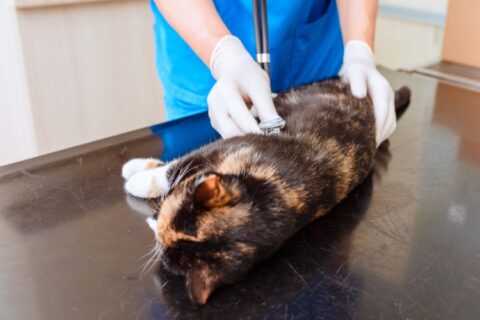National Heartworm Awareness Month
Every April, coinciding with the beginning of mosquito season, pet health professionals focus on the importance of heartworm disease prevention. Here are some frequently asked questions that can help keep you informed and your pet healthy:
What is Heartworm Disease?
Heartworm is a serious disease, caused by worms (heartworms) that live in the heart, lungs, and the associated blood vessels of affected pets. These heartworms can cause heart failure, lung disease, and damage to other organs of the body.
How does heartworm disease spread?
Mosquitos—when a mosquito bites and takes blood from an infected animal, it picks up “baby worms,” which will then develop into larvae (10-14 days). When the infected mosquito bites another animal, these larvae are passed through the bite wound. It takes about 6 months for the larvae to mature into adult heartworms, but they can live for multiple years in the infected animal.
What are the signs of heartworm disease in dogs?
Initially, many dogs may show no symptoms at all, but as the infection persists active dogs may exhibit:
- Coughing
- Lethargy
- Decreased activity
Eventually, dogs may develop:
- Heart failure
- Fluid buildup in the abdomen
- Weight loss
What are the signs of heartworm disease in cats?
- Coughing
- Asthma-like attacks
- Vomiting
- Lack of appetite
- Weight Loss
- Sudden collapse
What should I know about heartworm testing?
Early detection is key! Few symptoms present themselves early, so if your pet is not already on a heartworm preventative, talking to your veterinarian about running a heartworm test is important.
Dogs:
- All dogs should be tested annually for heartworm infection, which can be done during a routine wellness exam.
- These annual tests should be done even if your dog is on a heartworm preventative, to ensure that the program is working.
Cats:
- The good news: Cats are much less likely than dogs to have adult heartworms.
- The bad: This makes a detection in cats harder than in dogs.
- The test for heartworm in cats can include the use of an antigen and an antibody test – some veterinarians use x-rays or ultrasounds to look for heartworm infection.
Please visit the American Heartworm Society for more information and never hesitate to call us at (408) 426-8958 to discuss your pet’s heartworm prevention plan!


